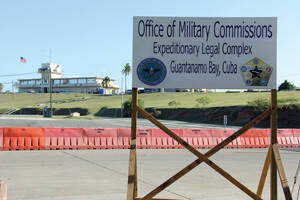More than 11 years after the attacks of Sept. 11, 2001, claimed the lives of their family members, nine people traveled to Guantánamo Bay, Cuba, in mid-October to attend the pre-trial hearings of Khalid Shaikh Mohammed, the attacks’ alleged mastermind, and four others accused of organizing and financing the attacks. The defendants, arraigned in May by U.S. military commissions, face execution if convicted.
By traveling to Guantánamo Bay, the family members had a unique opportunity to face personally the men accused of murdering their loved ones. Eleven years after that tragic day, the emotions were as raw as ever. “I wanted to walk past them when we came into the courtroom,” said Kathleen Haberman of Farmington, Wis., who traveled to the Guantánamo Bay facility with her husband, Gordon. Their daughter Andrea, then 25, died in the attack on the World Trade Center. “I truly wanted to just look in their faces because, to me, these cannot be human beings.... No human being would do this.”
Some family members spoke of the importance of faith in carrying them through the darkest moments since Sept. 11. “The Lord will help you through anything in life. You just have to ask,” said Mrs. Haberman.
Merrilly Noeth lost her son Michael, then 30, a member of the U.S. Navy, at the Pentagon on Sept. 11. “I know he is with me. I believe very firmly, and I always have,” she said.
Yet for those who attended the hearings, forgiveness is hard—even unthinkable. Forgiveness “for them?” asked Ms. Noeth. “I’m not that good.”
Mr. Haberman admitted: “That’s a tough one for me. When I sit in court with these guys, can I forgive them? I have a hard time. I mean, they don’t want my forgiveness. I think justice is the word.”
Dorine and Martin Toyen of Avon, Conn., lost their daughter Amy, then 24, in the World Trade Center. She was engaged to be married. “Her whole life was taken away from her,” said Mrs. Toyen. “There is no way I could ever forgive them.”
Mr. Toyen concurred. “I want justice, not forgiveness,” he said. “I’m still very bitter. Rage.” If the accused “are found guilty, then I would have no qualms with the death penalty.”
During the week of hearings, Army Col. James L. Pohl, chief judge of the military commissions, heard more than a dozen motions related to the defendants’ presence in court, what they are allowed to wear, how to treat classified information, calling and compelling witnesses, the applicability of the U.S. Constitution and whether the defendants should be able to recount on the record details of mistreatment while secretly detained by the Central Intelligence Agency.
Human rights organizations contest that the military commissions, a special court system created to try terrorism suspects, are unnecessary. Instead, they argue, the case should be moved to federal court, which has a proven record of trying and convicting terrorism suspects.
Peaceful Tomorrows, an organization of 9/11 families dedicated to peacemaking, agrees. The military commissions “currently fail to guarantee the fairness and respect for due process that federal trials would,” the group said. “Justice will be served only if the highest legal standards are met.”
Alexandra Scott of Stanford, Conn., who lost her father Randolph Scott, then 48, in the World Trade Center, shared her perception of the fairness of the current hearings. “There are different ways to gauge fair. Fair for whom? Fair for us?” she wondered. “This is 10 years in the making, but at the same time, it is also just the beginning. A matter of fairness is kind of hard to judge at this point."








